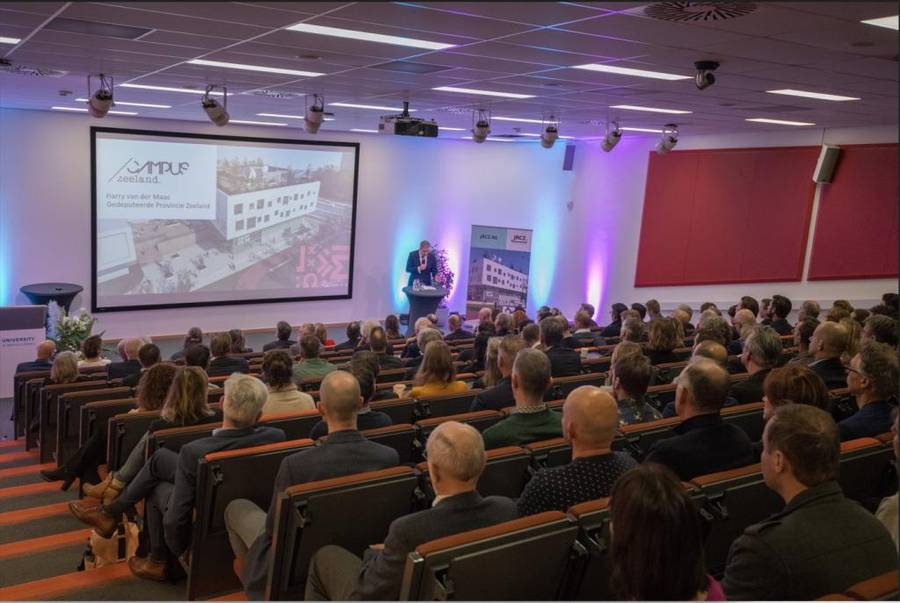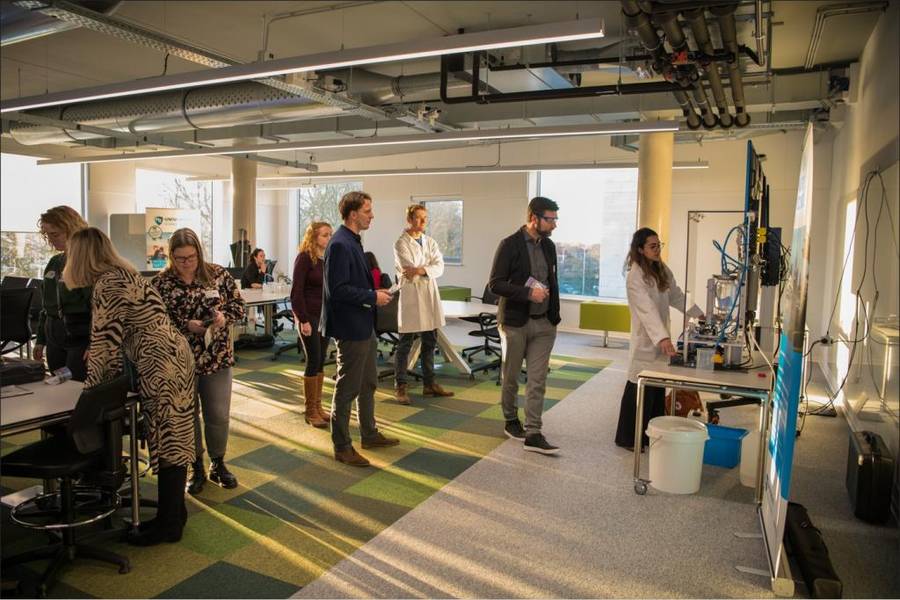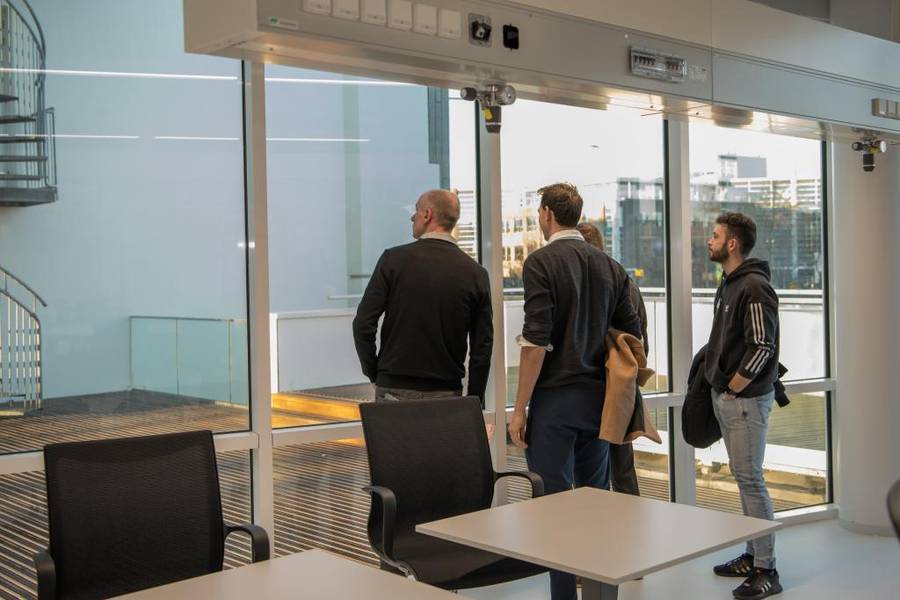Issues of our time
Starting in the second semester of the academic year, students from local educational institutions Scalda, HZ/UAS, and University College Roosevelt (UCR) will work on issues related to water, energy, food and biobased materials. Specific practical questions relevant to the delta region in Zeeland. The educational concept of the JRCZ allows students, researchers, companies, and government to come together in a state-of-the-art environment with the latest equipment and technology.
"I am convinced that such an educational concept has a rich breeding ground in this province."
Leo talks about the three o's: education, government and entrepreneurs. It has now been six years since the he was appointed as an engineering lecturer at HZ. Two years into his role, he was asked to join the project group around the JRCZ. Back then it was still an idea, that became more and more concrete: "I am a real creator and always looking for connection. From the teaching position, I was given the opportunity to help develop the concept from engineering and my technical background."
Barbara has been chairman of the board since 1 June 2022 and her experience comes from education and scientific research: "I am convinced that such an educational concept has a rich breeding ground in this province. It is an environment where innovation is paramount and where the themes of water, energy and food come into their own. Within an inspiring and innovative working environment filled with high-quality research equipment and practical rooms, contemporary issues are investigated. The JRCZ should ensure that science talent is attracted to our unique part of Zeeland. To answer contemporary issues together with knowledge institutions and industry."
Development research centre
Zeeland's economic and social development requires a good knowledge infrastructure. Where previously many young people still left the province for the Randstad, the JRCZ should ensure that education and research in our area takes off. Several reports have attracted the attention of influential parties. In 2016, the report 'Zeeland in Stroomversnelling' was released, written by the Commission Structure enhancement and Employment Zeeland. Its aim was to conduct an independent study on opportunities to strengthen Zeeland's economic structure and employment.
With the ambition to open a high-quality research centre, budget was also released for these plans. The government decided to invest in the research centre after former prime minister Jan-Peter Balkenende stated that education should be better aligned with the needs of the business community. Barbara says: "Over time, the idea was developed by different people. When the budget became available, we were able to strengthen our ambition and actually invest in Zeeland's economy. In our way and with the themes that suit the province. A research centre like JRCZ would not get off the ground in the Randstad either. Zeeland's small scale and innovative strength combine to create an incubator where research and education are possible. The combination of theory and practice allows us to launch solutions that contribute to making the energy sector more sustainable in the short term."
Leo adds: "As Zeeland, we do rely a bit on ourselves. We are small compared to the Brabant industry and the Randstad. That is why we choose to create a new hotspot with the JRCZ. From this location, we can not only mean something good, but also something general. What we research and develop here has an impact on big, contemporary issues."

Getting ready for business
The tight labour market also gets a boost from the JRCZ's innovative concept. Barbara: "Our mission is to contribute to a better world. In practice, we do this by fully supporting science talent with a brand new research centre. In addition, we make the connection with practice and students are linked to our partner network. This often creates the first opportunities on the labour market. Such as a first job, starting a start-up and overall practical experience at relevant parties. Students pull together with the business world and gain technical skills that are indispensable in the future of the energy sector. This often leads to surprising and useful results and creative solutions proposed from the students."
“Our mission is to contribute to a better world. in practice, we do that by fully supporting science talent with a brand new research centre."
The JRCZ and the themes of water, energy, food, and the biobased economy fit the DNA of Zeeland and the times we live in. The concept appeals to young people and they see that the topics matter. Leo: "There is a reason why students from abroad come to study here. With the opening of the JRCZ, those numbers will go up even more. With the expertise released in the process, we focus on strengthening and innovating the Zeeland economy. Students who previously preferred to go to the Randstad for a job or specific education can now go to their own province. Through the inspiring environment of the building in combination with interesting projects and research, we want to show students that Zeeland also has many complex issues that require solutions. With this, we want to show them and let them experience that it is appealing for students to settle in Zeeland."

Increasing the knowledge infrastructure of Zeeland
Offshore wind is an important part of today's energy transition and also a minor at HZ. Barbara says: "We are involved in offshore maintenance projects and are not unfamiliar with the issues surrounding offshore wind. At the JRCZ, energy is one of the themes that all parties involved are working on. As a result, Zeeland may become the province in the field of wind energy. Our activities and the JRCZ's network fan out across Zeeland and beyond. So anyone who wants to make a name for themselves in the energy sector can join our research centre. Current research at the various educational institutions is revealing interesting opportunities. For instance, they are investigating whether we can make plastic from algae, how to save water in beer brewing, and whether fungi can form a form of insulation in construction."
Leo also agrees that great things are already happening in Zeeland: "As a research teacher, I was involved in the AIRTuB project, which stands for Automatic Inspection & Repair of Turbine Blades. The HZ, Scalda, TU Delft and the Netherlands Air and Space Centre together developed a robot that can provide fully automated and autonomous inspection of wind turbine blades.
Among other things, degradation of the blades negatively affects energy yield. Another example is a research group that developed edible plastic. Film that sits around an apple, for example, is edible and keeps the fruit fresh. A sustainable alternative to the environmentally unfriendly plastic that now surrounds many fruits and vegetables. It's all about social issues that impact livability. The JRCZ brings everyone together in one place."
Makerspaces for research
On each floor of the building, spaces have been set up where students, teachers, and researchers come together, the so-called makerspaces. Here, they inspire and help each other solve problems. Leo: "This way of working immediately brings to light the combination of practical and theoretical training. We need thinkers and doers to arrive at solutions. Besides coming up with these solutions, we want to produce and design prototypes as smartly as possible. The makerspaces reveal the drive of thinkers and doers. Bringing education types together is a conscious goal of the people behind the JRCZ. We can approach complex issues from different perspectives. I have already revived the cooperation between Scalda and HZ and this cross-pollination brings great insights. At the JRCZ, we take it a step further and bring together MBO, HBO and WO. At one central location in the middle of Middelburg, in the South West Delta.
"The makerspaces reveal the drive of the thinkers and doers. We can approach complex issues from different perspectives."
We therefore see Zeeland as a testing ground for innovative sustainable energy and water safety concepts. We have the expertise to facilitate offshore companies and start collaborations. Barbara adds: "Together we are working on the future formula of not only Zeeland, but also the world outside of Zeeland. We are contributing to the great task we face as humanity. The energy sector is constantly evolving and with big data and bio-based materials, among others, we are making a difference. The high-tech laboratories for engineering, chemistry, ecology and a data lab are equipped with state-of-the-art equipment. This makes the JRCZ attractive not only for international students, but also for the partners we work with."
Growing network
Parties interested in collaborating or using the laboratories and research spaces can contact the JRCZ. HZ University of Applied Sciences already does so through HZ Nexus: the link between the outside world, education, and research. Leo himself contacts interested parties: "Together, we look at how the issue fits within the themes and the combination of education and research. Quality assurance is an important part of this. We are already getting requests for the use of our high-tech labs. Special initiatives emerge from the research that give students a boost on the labour market. They regularly start start-ups themselves or with the help of our network. It also happens that our partner companies offer students a first job. In this way, we not only attract science talent to Zeeland, but also retain them in the region."

